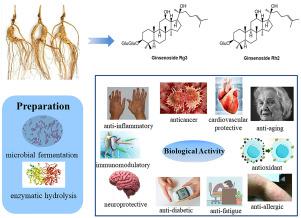Fitoterapia ( IF 2.5 ) Pub Date : 2023-04-20 , DOI: 10.1016/j.fitote.2023.105514 Wenqi Xu 1 , Wei Lyu 1 , Cuicui Duan 1 , Fumin Ma 1 , Xiaolei Li 2 , Dan Li 2

|
Ginseng, an ancient medicinal herb, is used in oriental medicine for the treatment of various diseases. Saponins are the main bioactive components of ginseng, but the multiple glucosyl side chains on its molecules prevent ginsenosides from entering the blood through the intestinal membrane, thus reducing the efficacy. The preparation of rare ginsenosides, which are easy to be absorbed by human body and have higher drug activity, has been widely practiced by removing the sugar group of natural ginsenosides in vitro. Rare ginsenosides Rg3 and Rh2 have been approved as drugs or health supplements to improve immune function. This review summarizes the preparation methods of ginsenoside Rg3 and Rh2 in recent years. Ginsenoside Rg3 and Rh2 were prepared by biotransformation of protopanaxadiol type ginsenoside, with the highest conversion rate of 98.19% and 95.89% in the laboratory, respectively. At present, improving the conversion rate and reducing the production cost are still the bottleneck of industrial scale production of Rg3 and Rh2 through the deglycosylation directly from Rb1, Rb2, Rb3, Rc and Rd in the crude extract of ginseng. In addition, ginsenosides Rg3 and Rh2 play anti-inflammatory, anticancer, cardiovascular protective, immunomodulatory, neuroprotective, anti-diabetic, anti-fatigue, anti-allergic, anti-aging, antioxidant and other pharmacological effects by activating AMPK, JNK, NF-κB, MAPKs, P13K/AKT/mTOR and other signaling pathways. As potential drugs for prevention and treatment of various diseases, ginsenoside Rg3 and Rh2 need to further clarify other underlying mechanisms of action through in vitro and in vivo experiments.
中文翻译:

稀有人参皂苷 Rg3 和 Rh2 的制备和生物活性:最新综述
人参是一种古老的草药,在东方医学中用于治疗各种疾病。皂甙是人参的主要生物活性成分,但其分子上的多个糖基侧链阻止人参皂苷通过肠膜进入血液,从而降低药效。通过体外去除天然人参皂苷的糖基制备易被人体吸收、药效较高的稀有人参皂苷已得到广泛应用。稀有的人参皂甙Rg3和Rh2已被批准作为提高免疫功能的药物或保健品。本文综述了近年来人参皂苷Rg3和Rh2的制备方法。人参皂苷 Rg3 和 Rh2 是通过生物转化制备的原人参二醇型人参皂苷,实验室最高转化率分别为98.19%和95.89%。目前,通过人参粗提物中的Rb1、Rb2、Rb3、Rc和Rd直接去糖基化,提高转化率和降低生产成本仍然是工业规模化生产Rg3和Rh2的瓶颈。此外,人参皂苷Rg3和Rh2具有抗炎、抗癌、心血管保护、免疫调节、通过激活AMPK、JNK、NF-κB、MAPKs、P13K/AKT/mTOR等信号通路发挥神经保护、抗糖尿病、抗疲劳、抗过敏、抗衰老、抗氧化等药理作用。作为预防和治疗多种疾病的潜在药物,人参皂苷Rg3和Rh2需要通过体外和体内实验进一步阐明其他潜在的作用机制。































 京公网安备 11010802027423号
京公网安备 11010802027423号